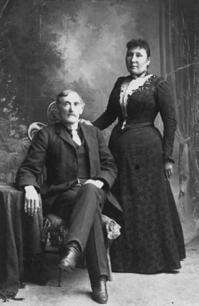Rethinking monogamy in Western Canada

(PhysOrg.com) -- You hear it all the time, especially in debates concerning same-sex marriage and polygamy: The biggest threat to the social order is the breakdown of monogamous marriage.
It's often assumed that this pervasive institution and its inherent values are ancient, universal, natural and unassailable. But University of Alberta historian Sarah Carter says nothing could be further from the truth, as she demonstrates in The Importance of Being Monogamous: Marriage and Nation Building in Western Canada to 1915.
Carter argues that in North America monogamous marriage was not a dominant world view until late in the 19th century and, far from taking root organically, was deliberately imposed on the Canadian frontier as a means of social control.
"The marriage 'fortress' was established to guard our way of life," writes Carter in the introduction to her study, which recently received an Alberta Book Publishing Award for best scholarly and academic book and was co-published by University of Alberta Press.
"Indeed it was considered vital to defend the 'fortress' of Canadian marriage in North America against the pernicious, corrupt and immoral influence of the United States, where it was understood that the marriage tie was loose and lax.
"Politicians, social reformers and judges widely agreed that marriage was a sacred institution that supported the whole social fabric and was essential to peace, order and good government in Canada."
The problem was, however, that prairie First Nations people had lived with diverse forms of marriage-including monogamy, polygamy and same-sex marriage-for centuries, to happy and harmonious effect. Divorce was easily obtained, remarriage was common and accepted, and, as Carter discovered, almost everyone had a spouse except those who didn't want to be married. In fur-trader society, many Métis marriages also followed this more flexible pattern.
But in order to build a new nation in its own image, British colonizers used the Christian marriage model to "maintain the new settlers' social and sexual distance from the Aboriginal population," argues Carter in her illustrated and meticulously researched book.
"The monogamous white husband-and-wife team was to be the basic economic and social building block of the West. They were to help produce not only crops, but also the future 'race' of Canadians who would populate the West.
"The health and wealth of the new region, and that of the entire nation, was seen as dependent on the establishment of the Christian, monogamous and lifelong model of marriage and family-the 'white life for two.'"
After the second Riel rebellion, the Métis were considered an especially pernicious threat to this way of life. Rumours circulating in London of rampant traffic in Aboriginal women was seen as sufficient justification for the Department of Indian Affairs to intervene in First Nations marriages, mainly as a strategy for keeping women on the reserve and under the control of Aboriginal men.
"The marriages or alliances that had created the Métis were seen as at the root of the problem, so there was in all sorts of ways all kinds of factions came together to try and discredit and discourage Aboriginal women and these marriages," said Carter.
Indian Affairs had enormous power to dictate terms of marriage, sanctioning matches they liked and prohibiting ones they didn't, says Carter. If faced with a match they considered unsavory, they would put the girl in residential school to prevent her marriage, a practice which only encouraged Aboriginal families to marry off their girls at an earlier age.
While all of this seems far removed from contemporary life, Carter's study serves as an important reminder that the definition of marriage can never be taken for granted and is always a reflection of a particular time and place, subject to the manipulations and abuses of state power.
As the Book Publishers' Award jury put it, "this year's recipient is a book that has the potential to make a long-lasting impact on the study of early Canadian history, as well as current national policy...This is a first-rate example of why scholarly monographs matter."
Provided by University of Alberta (news : web)















